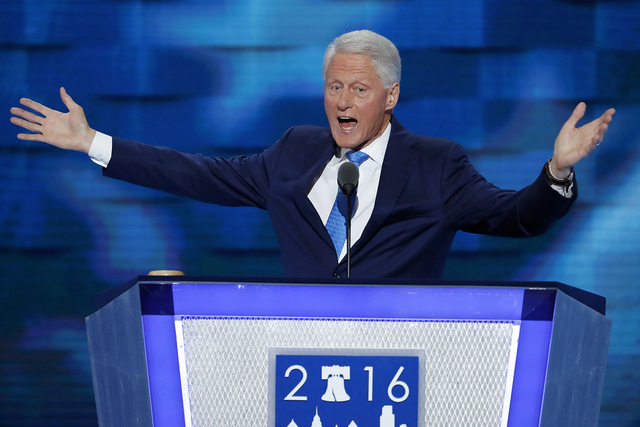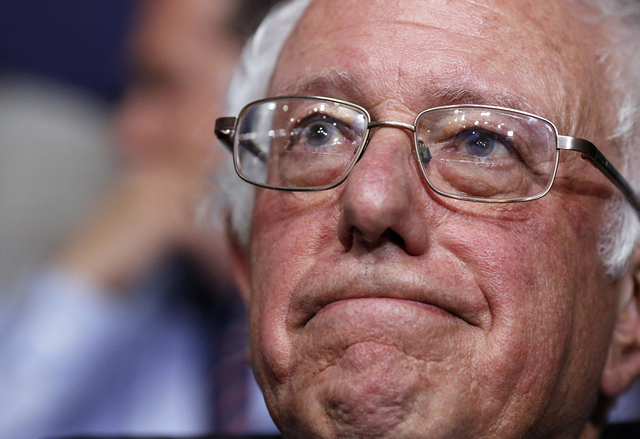Philadelphia — Hillary Clinton was nominated Tuesday as the first woman to run as the presidential candidate of a major U.S. political party, after a gesture by former Democratic rival Bernie Sanders to declare her the nominee that was meant to signal party unity.
Philadelphia — Hillary Clinton was nominated Tuesday as the first woman to run as the presidential candidate of a major U.S. political party, after a gesture by former Democratic rival Bernie Sanders to declare her the nominee that was meant to signal party unity.
In a dramatic move, Sanders took the microphone in the Vermont delegation at the end of a roll call vote of states to ask for his former rival to unanimously be named the party’s nominee. With that, a year-long battle that has divided the party was over, and Clinton was formally selected to face Republican Donald Trump in the November election.
“It’s extraordinary,” Senator Brian Schatz of Hawaii said in an interview moments after the historic vote. “Conventions don’t work without a little drama, and we had some serious drama.”
Clinton was pushed over the threshold of delegates after South Dakota cast its votes in a traditional roll call vote, but there was no acknowledgment of the moment in the arena and the count continued. Vermont passed on submitting its votes until the end and then, in a moment orchestrated after negotiations between the Clinton and Sanders camps, Sanders made a motion to suspend the rules and declare her the nominee by acclimation while also recording the votes of his supporters.
Bid for Unity
“I move that all votes, all votes cast by delegates be reflected in the official record,” Sanders said. “And I move that Hillary Clinton be selected as the nominee of the Democratic Party for president of the United States,” he said before being drowned out by cheers.
Delegates erupted in a loud “aye,” when the call for the vote was made, though there were some audible “boos” in the arena as the song “Happy” began to blare.
The step was meant to signify party unity after Sanders supporters on Monday registered their anger with heckling and chanting during the convention proceedings.
“There is a lot of heartache in politics. But what Bernie showed today is that you can go from revolutionary to statesman,” Representative Peter Welch, a superdelegate from Sanders’s home state who backed the senator, said after the roll call.
Historic Moment
Virginia Governor Terry McAuliffe took the stage after Clinton’s nomination was sealed to put an exclamation point on the historic moment.
“It’s a day that I guarantee you’ll remember forever,” he said. “Because you’ll be able to say, ‘I was there when we nominated Hillary Clinton to be our next president of the United States.’”
The boos and jeers that marked the convention’s opening day were muted and scattered as delegations, one-by-one, announced their tallies. They were replaced by chants of “Bernie! Bernie!” that rolled through the crowd when his delegate votes were cast, and loud cheers for Clinton when her totals from big states, such as California, Florida and New York, were announced.
Several dozen Sanders supporters walked out of the arena after the vote and protested at a media tent next to the arena, drawing police and Secret Service officers after some of them entered the tent and staged a sit-in. Some protesters sang the Woody Guthrie ballad “This Land is Your Land” and others chanted, “This is what Democracy looks like.” Another group of young Sanders supporters staged a silent protest near an exit of the arena.
“I’m sad today,” said Erika Onsrud, a 37-year-old Sanders delegate and Medicare insurance broker from Minneapolis. “We know that we were cheated this primary cycle.”
‘Glass Ceiling’
Maryland Senator Barbara Mikulski, the longest-serving woman in congressional history, placed Clinton’s name into nomination “on behalf of all the women who’ve broken down barriers for others, and with an eye toward the barriers still ahead,” she said, as the delegates chanted “Hillary, Hillary.”
The nomination was seconded by John Lewis, an icon of the civil rights movement and a U.S. representative from Georgia.
“Eight years ago, our party nominated and elected the first person of color to ever serve in the White House not just for one, but two terms,” Lewis said. “Tonight we will shatter that glass ceiling again.”
Roll Call
Democrats used the nomination process in 2008 to demonstrate their consolidation after a closely fought campaign between Clinton and then-Senator Barack Obama. Clinton made a motion allowing Obama to be nominated by acclimation in the middle of the roll call. This year the roll call went to the end so that Sanders’s delegates could be counted.
Valerie Kean Staab, a Clinton delegate from Conneaut Lake, Pennsylvania, said she expected the voting to provide some closure for Sanders voters after a hard-fought campaign .
“Yesterday was the day for everybody to enjoy their screaming and get their catharsis. Today is the day we unify,” she said in an interview on the convention floor before the roll call of delegations. “People are angry, but we’ll unite.”
Democratic Divisions
The sometimes-bitter primary fight between Clinton and Sanders, combined with the release of hacked Democratic National Committee e-mails on Friday showing that party leaders favored Clinton during the primaries, fueled anger among Sanders supporters at the convention. The resulting furor forced Chairwoman Debbie Wasserman Schultz to resign effective at the end of the convention and even to relinquish her role gaveling the proceedings to order.


